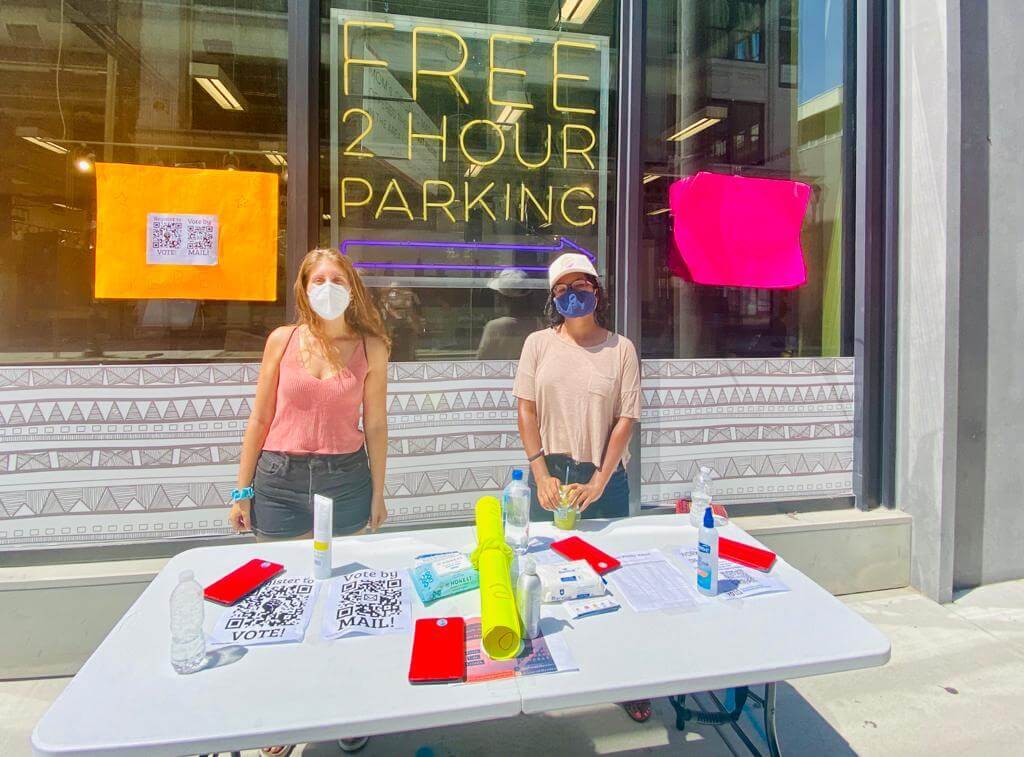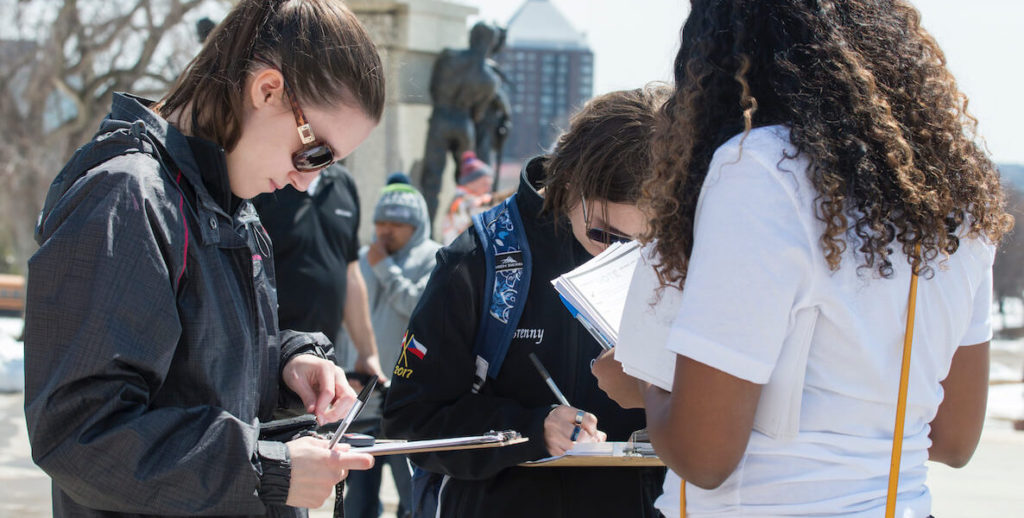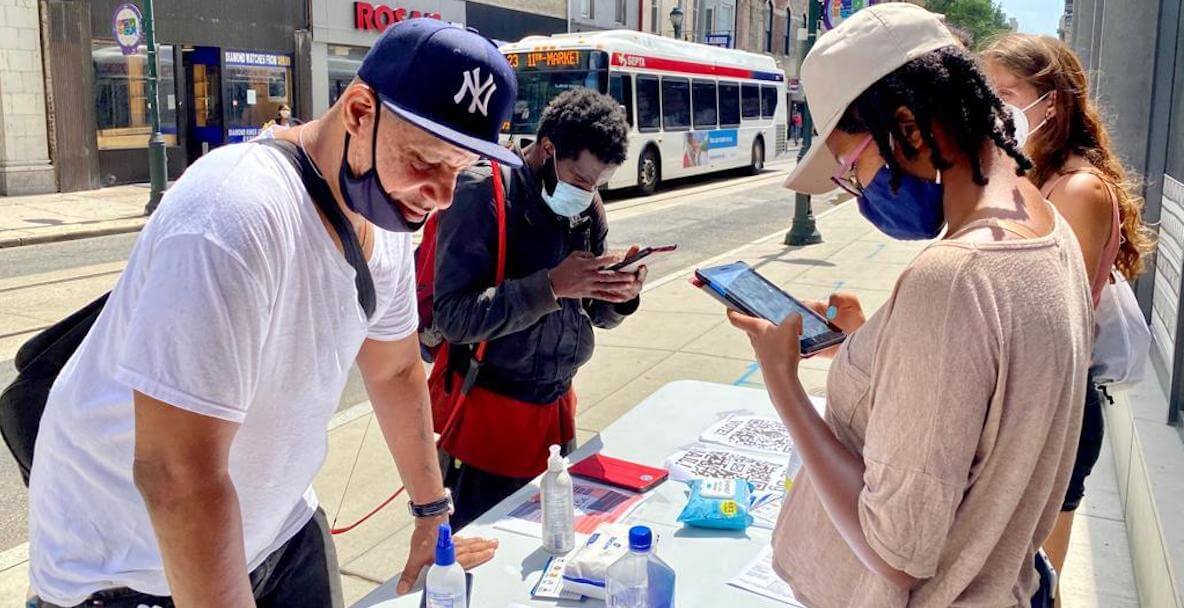Here in Philadelphia, getting people to the polls is a mighty and laudable pursuit. There are two elections in 2024, although most of us are paying attention to the second one. Now is the time to get your fellow citizens ready to vote — by starting your very own voter registration drive.
First, some details.
The first election of 2024 is the primary on April 23, 2024, where voters determine their nominees for President of the United States, PA Attorney General, Auditor General and Treasurer, local representatives in the U.S. Congress, a number of state senators and representatives for the General Assembly, and delegates to the Democratic and Republican national conventions.
The general election — Election Day 2024 — is November 5. The outcome of that election will determine:
- The President of the United States, most likely Democratic incumbent Joe Biden or Republican former office-holder Donald Trump
- U.S. Senator: three-term incumbent Bob Casey (Democrat) or challenger David McCormick
- Pennsylvania Attorney General
- PA Auditor General
- PA State Treasurer
- U.S. Rep to Congress for the 2nd District, Northeast, some of North Philadelphia and River Wards), incumbent Brendan Boyle (Democrat), challenger Salem Snow (Democrat)
- U.S. Rep to Congress for the 3rd District (Center City, West and North Philadelphia), incumbent Dwight Evans (Democrat)
- U.S. Rep to Congress for the 5th District, Delaware County, some Chester and Montgomery counties, parts of South Philadelphia, incumbent Mary Gay Scanlon (Democrat) and Dasha Pruett (Republican)
- Various senators and representatives of districts in the PA General Assembly
- Delegates to the Democratic and Republican national conventions
In order to vote in this election, you’ll need to register first — in person, online, or by mail, by April 8. And you might want to help some other people register, too.
We talked to local election experts for tips on how to start a voter registration drive in Philadelphia, post-pandemic. Below, what they had to share.
![]()
12 STEPS TO STARTING A VOTER REGISTRATION DRIVE IN PHILLY
1. Educate yourself on voting rules and regulations
Before you register others—or yourself—to vote, it’s important to read up on voting rules and regulations. You can read about voter eligibility requirements on the Department of State website when reviewing the PA voter registration application.
Note:
- You must be a U.S. citizen and a resident of Pennsylvania for at least 30 days before the next election in order to register to vote. For prospective citizens, following this rule is crucial as registering prematurely can bar a person from obtaining U.S. citizenship, entirely.
- You must be at least 18 years old to vote.
- The last day to register to vote in the April 23 primary is April 8, 2024.
- The last day to register for the November 5 election is October 21, 2024.
- PA residents can vote by mail up to 50 days before an election. Mail-in ballot applications must be received by the county office by 5pm on April 8 for the primary election and October 21 for the general election.
2. Plan out how you’re going to convey clear, comprehensive information to new voters
Especially when registering young people or new citizens to vote, it is important to clearly explain the above voting rules so that you don’t register someone who is ineligible to vote. Non citizens who vote in national or state elections could face harsh penalties like imprisonment or deportation, or ruin their chances of securing U.S. citizenship.
Kendra Cochran, the director of civic engagement at interfaith organization POWER, has overseen various voter registration efforts before and during the pandemic. She recommends making an informational one-pager to explain some of these rules, especially if you are running an in-person registration drive. You can use the sheet as a script for verbal conversations, or give copies to the people you encounter.
3. Get to know your neighborhood; utilize partnerships
Sometimes it can be more productive to join an online voter registration effort than to start a drive yourself. Reach out to organizations in your community to see what already exists.
4. Don’t discuss politics
It seems counterintuitive, but it’s been proven over and over: Connecting to unregistered (and undecided) voters on a personal level is much more effective than discussing the day’s news or the latest political scandal with a total stranger. The organization Changing The Conversation Together (CTC) uses storytelling and listening to help get voters to vote in order to build “a more inclusive and compassionate democracy.”
Here’s how it works (hit the link below for details):
You approach a stranger. You tell a true story (rehearse first) about someone you love who needs you to vote. It could be your child, who goes to public school. Your grandmother, who is on Medicare. Your neighbor, who lost their job. After you tell your, you ask if the person you’re talking with loves someone connected to an issue that’s on the line this (or any) election. You ask if they’ll vote for the person they love.
5. Stock up on supplies
-

Photo courtesy of Sheyla Street of Philly Youth Vote
If your goal is to register a large number of voters, you’re going to need a large number of voter registration forms. You can get free copies at the City Commissioners office, with locations in City Hall (1400 JFK Boulevard, Room 142) and at the Voter Registration Office (520 N. Columbus Boulevard, 5th floor) Most libraries and Post Offices should have forms, too.
Registration forms can also be downloaded and printed from the PA Department of State website. However, if printing yourself, be sure that you are printing everything, Cochran warns, as voters cannot register via an incomplete form.
6. Schedule regular drops to the Commissioners office
Keeping completed registration forms in a safe place, like a secure envelope, and dropping them off at the Commissioners office within 24 hours can help your team stay organized and ensure that forms are accepted.
“Organizations will collect these paper applications, and they never make it down there, or they make it down there and it’s not in a timely fashion and folks miss the date,” Cochran says. “So if you’re going to do paper I would say have a plan to drop it off within 24 hours of collection.”
She recommends designating a team member who is in charge of collecting the completing forms and making these drops.
7. Stand outside community centers or high-traffic areas

Public spots that make great places to register voters: Outside supermarkets or big-box stores, busy parks and playground. Go to places where people feel comfortable, and have time to talk, says Cochran. Because POWER is an interfaith organization, it utilizes congregations. But you can also consider setting up at outdoor events, farmers markets, community meetings, rec centers …
8. Be distinguishable, and give people space
Cochran recommends simple ways of distinguishing yourself like wearing an identifiable T-shirt, or holding a sign, to let people know what you’re doing.
9. Know your target
Understanding the people you are registering, and their level of exposure to civic engagement activities can help you determine what combination of the following tips work best for your community.
“I called it, ‘knowing your target,’” says Piri Pantoja, who coined the phrase while running a voter registration drive for the 2020 presidential election at Temple University.
On campus, his target was students, who, he found, were more interested in registering to vote if they understood why civic engagement mattered. So, his efforts included educating students about the platforms the candidates were running on.
“Saying ‘this is what’s at stake in this election,’” Pantoja says. “Make sure we’re mentioning key things on the ballot, because nobody’s going to know if they’re not trying to get involved.”
For Cochran, knowing your target also means knowing how much assistance they would need in the registration process. The people POWER serves are often marginalized, she says, so her group makes sure to not only educate them on voter requirements, but to walk them through all steps of the process. That includes not only helping them fill out the form, but collecting it, and dropping it off for them.
“If they are not typically interested in voting or it’s not at the top of their list, it’s not going to become the top of their list because they filled this form out,” Cochran says. “That form will fall by the wayside nine times out of 10.”
10. Register people on a tablet or your phone
Everybody has a smartphone nowadays, Cochran says. So even if you don’t have a lot of money, printing access, or a large parking lot for a drive-through registration, you can register people to vote. The voter registration form at pavotes.org allows you to submit all the information electronically, which is the fastest and simplest way to ensure the registration goes through.
“You have to be innovative, nowadays, don’t let money be your barrier,” Cochran says. “If you can’t afford a tablet it’s fine, you can do it right on your phone, it works just the same.”
You can use disposable styluses (which you can purchase in bulk on Amazon) with your phone, as well.
11. Set up a drive-through registration
Hey: Drive-through exchanges are now commonplace for all manner of errands — picking up groceries, donating clothing, shopping at Target. They work for voter registration too, provided you:
Partner with an organization that has a parking lot, and that will allow you to set up a table, van, or tent with volunteers and supplies. (Think drive-through Covid testing/vaccination sites).
POWER hosted a drive through voter registration drive during the 2020 presidential election, which was a huge success, Cochran says. To facilitate the drive, they partnered with local congregations and helped people register online by using tablets and disposable stylists.
12. Do not incentivize voting
Incentivizing voting in certain elections is against the law. So, if you’re giving out stickers or candy, make sure you’re giving them out to everyone — not just those you register to vote.
“We want to make sure that we’re aboveboard in all that we’re doing,” Cochran says. “We want to make sure that we don’t give anyone any reason to claim voter fraud or any type of registration fraud, we want to make sure that we’re doing things the right way.”
This guide was updated in February 2024 for the April 23, 2024 primary election and the November 5, 2024 general election.
![]()
MORE ON VOTING IN PHILLY AND PA
Photo courtesy of Sheyla Street of Philly Youth Vote


